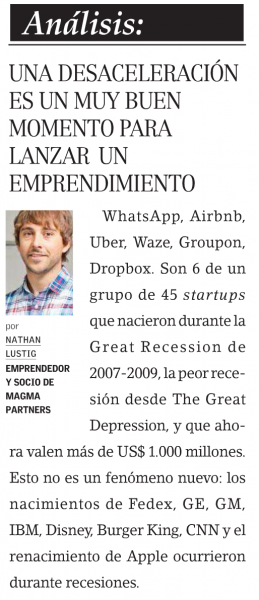A version of this post originally appeared in Spanish as a column in El Mercurio, Chile’s equivalent of the New York Times with the title Una desaceleración es un muy buen momento para lanzar un emprendimiento.
As some context to my non-chilean readers, Chile, along with most resource producing countries, is currently going through an economic slowdown. Most of Chile’s government revenue comes from Copper sales, who’s price has gone down by 55% from its peak. Although Chile’s not in a recession yet and Chile’s economy is in great shape compared to other Latam countries, unemployment is up, businesses are investing less and people are worried.
Here’s the original column:
Whatsapp, Airbnb, Uber, Waze, Groupon, Slack, Square, Pinterest, Dropbox, Lending Club, Fitbit, Lyft, Credit Karma. What do these companies all have in common? They’re part of a group of 45 startups that were started during The Great Recession of 2007-2009, the worst recession since The Great Depression, that are now worth more than US$1B.
It’s not a new phenomenon. Companies like Fedex, GE, GM, IBM, Disney, Burger King, CNN were all started during recessions. So was Apple’s rebirth into the giant company as we know today.
When the economy slows down, convencional widsom states that almost all businesses will struggle. But economic slowdowns present opportunities to create new, successful businesses.
Big businesses invest less, fire good employees and start to cut costs. They’re more likely to try something new that helps them cut costs. And the opportunity cost of starting a new business is lower for potential entrepreneurs because there are fewer good jobs available in the market.
Entrepreneurs birth new business models as a result of an economic slowdown. Who would have thought people would rent out extra bedrooms for extra cash to complete strangers via the internet? But when the Airbnb founders couldn’t pay their San Francisco rent, they launched Airbnb.
When banks were afraid to create new loans, entrepreneurs launched Lending Club, where anyone could ask for a crowdfunded loan.
When people didn’t have enough money to make their car payments, entrepreneurs launched Uber and Lyft to allow people to make money using their cars.
We’re going through a slow period in the Chilean economy. Lots of people have lost their jobs, most companies are investing less and cutting costs, trying to improve efficiency. Now that the opportunity costs of starting a company is less than in the boom years, which chilean entrepreneurs are going to take advantage of the slowdown to launch great companies?
